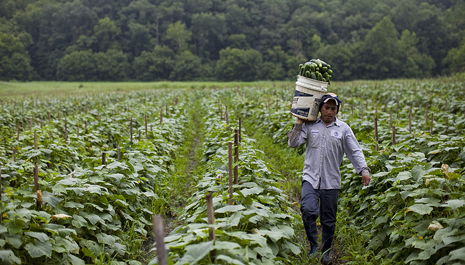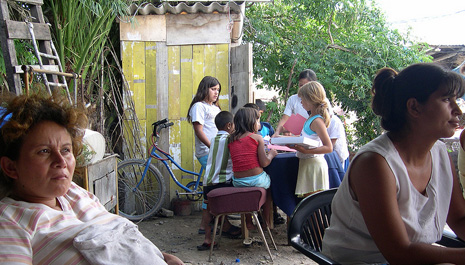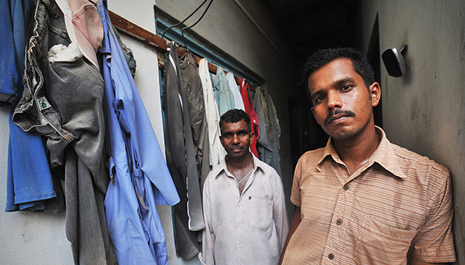Decent Work
(Research papers and policy briefs below)
Over 90 percent of migration today –whether for reasons of employment, family reunification, immigration, education, or due to refugee flight—is bound up in employment and economic activity outcomes. ILO calculated that people –including refugees – living outside their countries of birth or origin in 2019 were active migrant workers (ILO, 2021), meaning economically active – employed, self-employed or otherwise engaged in remunerative activity. Economically active/employed migrant workers in 2019 were 70.1 percent of all working age international migrants
According to ILO estimates, around 90% of international migration today is bound up in the world of work: an estimated 169 million of the 272 million people living outside countries of birth or citizenship in 2019 were economically active (ILO, 2021), meaning employed, self-employed or otherwise engaged in remunerated activity. That comprises most working-age people in the 'migrant' population, including refugees and asylum seekers as well as persons migrating for family reunification. Once recognized and/or resettled, refugee and asylee adults need to work while most children immigrating for family reunification enter the labour market when they reach working age. Assuming one dependent for each economically active person in this population gives a total of about 350 million migrants economically active or dependent on those who are. These estimates do not include short-term or seasonal migrants, for whom no global figures are available.
However, as the International Labour Conference summarized it:
Despite the positive experiences of migrant workers, a significant number face undue hardships and abuse in the form of low wages, poor working conditions, virtual absence of social protection, denial of freedom of association and workers' rights, discrimination and xenophobia, as well as social exclusion. Gaps in working conditions, wages and treatment exist among migrant workers and between migrant and national workers. In a significant number of cases unemployment rates, job security and wages differ between regular migrant workers and national workers.
(Resolution concerning a fair deal for migrant workers in a global economy, International Labour Conference, Geneva, 2004)
Obtaining decent work conditions for migrants and protecting migrant workers are universal challenges today as globalized economic competition and deregulation increase pressures to reduce workplace protection. (See also Health and migration) Key issues include: recognizing labour rights as human rights; legislating and implementing labour standards such as those on occupational safety and health working conditions, maternity protection and freedom of association applicable in all workplaces; and ensuring adequate and effective monitoring—labour inspection—to enforce the law.
GMPA experts conduct research, policy development and advisory services, in particular with social partner employers' and trade union organizations, to support extending decent work to all migrant workers.
Documents and Papers
- COVID-19, Migrants, Refugees, Mobile Workers: Global Assessment and Action Agenda. P.Taran & O.Kadysheva, 2022. Revista Tecnológica - Espol
- COVID-19 Pandemic and Migrant Workers in Malaysia and Singapore with Special Focus on South Asian Workers. P.Wickramasekara, 2020.
- “Guest Opinion: Junie Joseph and Patrick Taran: A day for workers across the globe”, Boulder Daily Camera, Boulder Colorado. April 29, 2021
- Malaysia: Review of admission and recruitment practices of Indonesian workers in the plantation and domestic work sectors and related recommendations. P.Wickramasekara, ILO, 2020.
- Accession with low compliance: Sri Lanka’s experience with the 1990 International Convention on Migrant Workers. P.Wickramasekara, 2019.
- Effective return and reintegration of migrant workers with special focus on ASEAN Member States. P.Wickramasekara, ILO, 2019.
- Core elements of a bilateral agreement or a memorandum of understanding on labour migration. P.Wickramasekara, ILO, 2018.
- Assessment guide for bilateral agreements and memoranda of understanding on labour migration with special focus on Bangladesh. P.Wickramasekara, ILO, 2018.
- Good Practices and Provisions in Multilateral and Bilateral Labour Agreements and Memoranda of Understanding. P.Wickramasekara, ILO, 2018.
- Engaging the Diaspora and Migrant Workers for Home Country Development: Diaspora Finance and Remittances. P.Wickramasekara, E.Tennant & P.Taran (2018). ADBI – OECD – ILO.
- Labour migration for decent work in Afghanistan: Issues and Challenges, WICKRAMASEKARA & BARUAH, 2013.
- Labour inspection and migrant workers: Special challenges in an age of globalization and deregulation. P.Taran, 2012.
- Crisis, Migration, Precarious Work: Impacts and Responses - Focus on EU Countries, TARAN, 2012.
- Migration, Globalization and Decent Work: What Role for Labour Inspection, TARAN, 2005.
- Globalization, Labour and Migration: A Call for Legal Protection and a Summary of Anti-Discrimination Initiatives TARAN, 2002.





